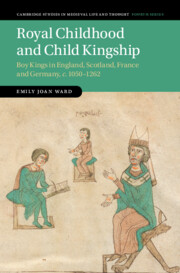Book contents
- Royal Childhood and Child Kingship
- Cambridge Studies in Medieval Life and Thought
- Royal Childhood and Child Kingship
- Copyright page
- Dedication
- Contents
- Figures
- Preface and Acknowledgements
- Abbreviations
- Genealogies
- Chapter 1 Royal Childhood and Child Kingship
- Part I Royal Childhood and Child Kingship: Models and History
- Part II Royal Childhood: Preparation for the Throne
- Chapter 4 Familial Education
- Chapter 5 Loyalty, Diplomacy and (Co-)Kingship
- Chapter 6 The Royal Deathbed
- Part III Child Kingship: Guardianship and Royal Rule
- Bibliography
- Index
Chapter 5 - Loyalty, Diplomacy and (Co-)Kingship
Preparing Political Communities
from Part II - Royal Childhood: Preparation for the Throne
Published online by Cambridge University Press: 04 August 2022
- Royal Childhood and Child Kingship
- Cambridge Studies in Medieval Life and Thought
- Royal Childhood and Child Kingship
- Copyright page
- Dedication
- Contents
- Figures
- Preface and Acknowledgements
- Abbreviations
- Genealogies
- Chapter 1 Royal Childhood and Child Kingship
- Part I Royal Childhood and Child Kingship: Models and History
- Part II Royal Childhood: Preparation for the Throne
- Chapter 4 Familial Education
- Chapter 5 Loyalty, Diplomacy and (Co-)Kingship
- Chapter 6 The Royal Deathbed
- Part III Child Kingship: Guardianship and Royal Rule
- Bibliography
- Index
Summary
Turning to more ceremonial, less habitual actions in which a young heir’s active participation could be vital, this chapter stresses the political community’s wider investment in children as political actors. Royal children were both enablers and facilitators of diplomacy rather than merely pawns in the diplomatic and political games of adults. Children’s participation could be decisive to acts of association and diplomacy, and thus vital to readying the realm for their succession and rule. The chapter first examines attempts to secure magnate loyalty to children through oaths of fidelity and performances of homage. The earliest stages of the male life cycle had unique attributes in regard to demonstrations of loyalty, and there were substantial benefits in securing oaths to children when they were so young. The chapter then turns to focus on children’s incorporation within performances of cross-kingdom diplomacy, an important aspect of children’s education. The final section foregrounds the chanson de geste Le couronnement de Louis to examine the importance of children’s dynamic contribution at coronation and the wider political community’s investment in boy kings.
- Type
- Chapter
- Information
- Royal Childhood and Child KingshipBoy Kings in England, Scotland, France and Germany, c. 1050–1262, pp. 115 - 146Publisher: Cambridge University PressPrint publication year: 2022

